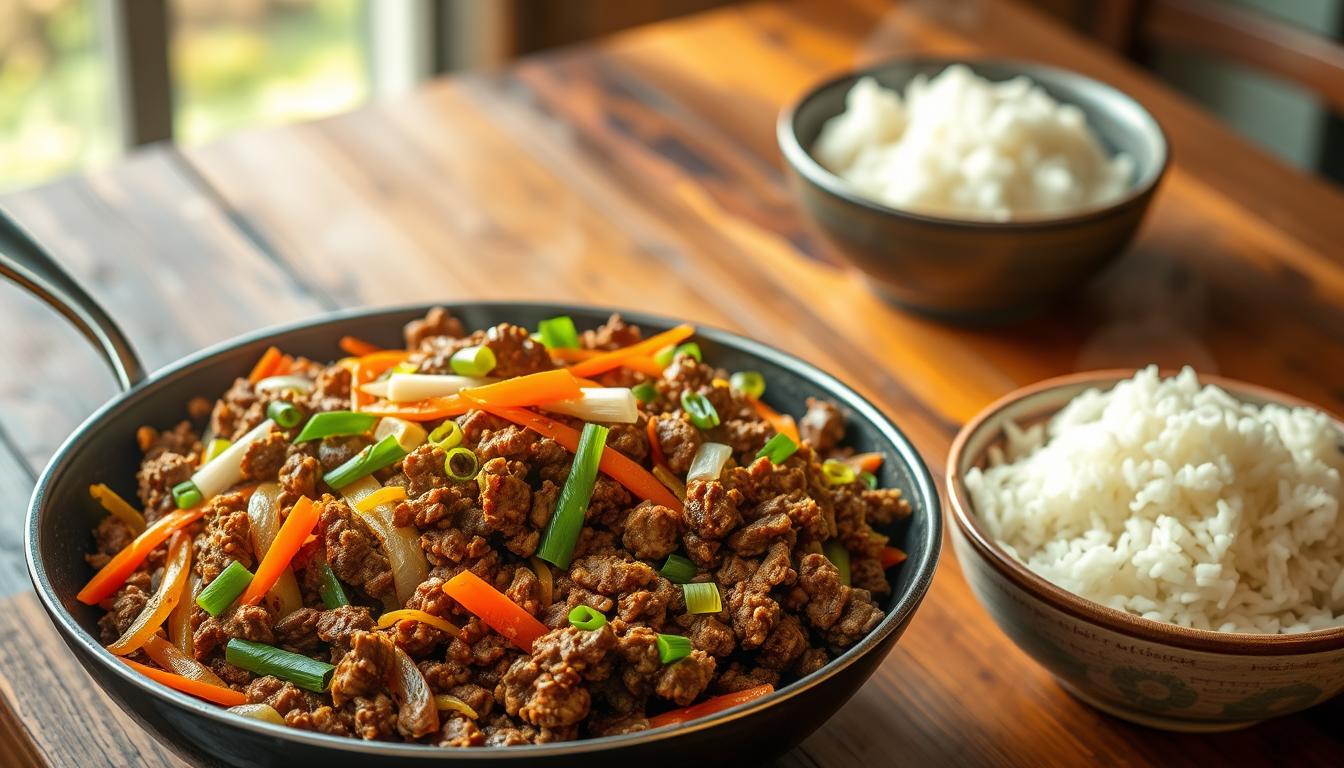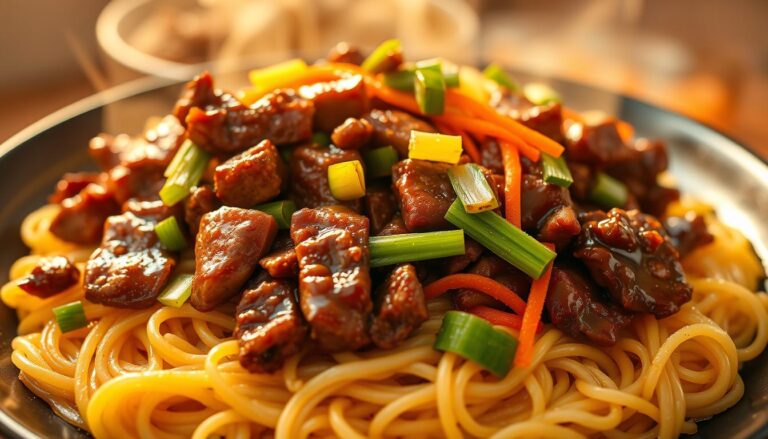Step-by-Step Mongolian Ground Beef Cooking Tips
Table of Contents
Are you ready to explore the flavors of Asia with a twist? Mongolian ground beef is a delicious and easy-to-make dish. It combines the savory taste of beef with the bold flavors of Mongolian cuisine.
This popular recipe is a variation of the traditional Mongolian beef. It uses ground beef for a quicker and more accessible meal. In this article, we will guide you through the step-by-step process of cooking Mongolian beef with ground beef. This ensures a mouth-watering result every time.
Key Takeaways
- Learn how to make a delicious Mongolian ground beef dish.
- Understand the basics of Mongolian cuisine and its flavors.
- Discover the benefits of using ground beef in Mongolian recipes.
- Get step-by-step cooking instructions for a perfect meal.
- Explore tips for customizing the recipe to your taste.
What Is Authentic Mongolian Ground Beef?
Authentic Mongolian ground beef is quite different from what you might find in the US. As you dive into mongolian beef and noodles, learning about its origins can deepen your respect for the dish.
Origins of Mongolian Beef
Mongolian beef doesn’t actually come from Mongolia. It comes from Chinese cooking traditions, which have changed over time. This dish was likely inspired by Chinese stir-frying, focusing on beef.
Traditional vs. American-Chinese Versions
The real Mongolian beef uses sliced beef, veggies, and a tasty sauce, served over noodles. But American-Chinese versions, like ground beef ones, mix in local tastes. This makes chinese ground beef recipes diverse, including Mongolian ground beef.
Knowing these differences can make you appreciate Mongolian beef’s flexibility. It encourages you to try making your own versions at home.
Essential Ingredients for Perfect Mongolian Ground Beef
To make authentic Mongolian ground beef, you’ll need a few key ingredients. The quality and type of these ingredients greatly affect the flavor and texture of your dish.
Selecting the Right Ground Beef
Choosing the right ground beef is critical for Mongolian ground beef. Look for a mix with 80/20 or 85/15 lean to fat ratio. This ratio gives enough fat for flavor without being too greasy.
You can also choose grass-fed or lean beef for a healthier option. But, keep in mind it might change the taste and texture slightly.
Key Sauce Components
The sauce is a key part of Mongolian ground beef. You’ll need soy sauce, hoisin sauce, and sometimes oyster sauce for depth. Brown sugar balances the savory flavors, and cornstarch thickens the sauce.
Must-Have Aromatics and Vegetables
Aromatics like garlic and ginger are essential for Mongolian beef’s flavor. Onions and scallions add crunch and freshness. You can also add bell peppers or other vegetables to improve texture and flavor.
By focusing on these essential ingredients, you’ll be well on your way to creating a delicious and authentic Mongolian ground beef dish.
Kitchen Equipment You’ll Need
Preparing tasty Mongolian beef with ground beef requires the right tools. You’ll need to pick the best cookware and utensils for success.
Wok vs. Skillet Considerations
For cooking Mongolian ground beef, you can choose between a wok or a skillet. A wok is great because it’s big and deep, helping food cook evenly. But, a large skillet works well if you don’t have a wok.
Other Helpful Tools
Having the right utensils can also help a lot. You might want:
- A spatula for stirring and turning the beef
- A cutting board for chopping veggies
- A measuring cup for mixing sauce ingredients right
Preparing Your Ingredients for Mongolian Ground Beef
Getting ready for Mongolian Ground Beef cooking starts with preparing your ingredients well. Make sure you have everything you need before you begin.
Meat Preparation Techniques
First, take the ground beef out of the fridge and let it warm up for 15 minutes. This makes it cook more evenly. Next, break the meat into small pieces with your hands or a spoon. This is key for the right texture in your dish.
Vegetable Cutting Guide
For the veggies, chop the onions, bell peppers, and scallions. Cut the onions and bell peppers into thin slices, making them the same size for even cooking. Slice the scallions into thin rounds, separating the white and green parts. The white parts cook with the meat, and the green parts are for garnish.
Sauce Mixture Preparation
To make the sauce, mix soy sauce, oyster sauce (if using), hoisin sauce, and cornstarch in a bowl. Add minced garlic and ginger and stir well. Preparing the sauce ahead of time helps the flavors blend perfectly while cooking.
| Ingredient | Preparation Method | Purpose |
|---|---|---|
| Ground Beef | Break into small crumbles | Even cooking and texture |
| Onions and Bell Peppers | Cut into thin slices | Even cooking and presentation |
| Scallions | Slice into thin rounds | Garnish and added flavor |
| Sauce Mixture | Mix all ingredients in a bowl | Combines flavors for the dish |
By following these steps, you’re on your way to a tasty Mongolian Ground Beef dish. Serve it over Mongolian noodles or rice for a full meal.
Step-by-Step Cooking Process for Mongolian Ground Beef
The secret to great Mongolian Ground Beef is in how you cook it. To get a dish that’s full of flavor and has a nice texture, follow these steps carefully.
Browning the Ground Beef Properly
First, heat a tablespoon of oil in a wok or large skillet over medium-high heat. Add the ground beef, breaking it up with a spatula as it cooks. Make sure the beef is browned evenly; this step is key for flavor.
You can tell if the beef is browned right by its color. It should be a rich, caramelized brown.
Adding Aromatics at the Right Time
After the beef is browned, add sliced onions, minced garlic, and grated ginger. Cook until the onions are translucent, stirring often to avoid burning. This step adds a lot to the dish’s aroma, making it a standout in chinese ground beef recipes.
Incorporating the Sauce
Then, pour in the prepared sauce, stirring constantly to coat the beef and onions evenly. The sauce will thicken as it cooks. You can adjust its thickness by adding a little water or cornstarch mixture. Serve the Mongolian Ground Beef over noodles for a tasty mongolian beef and noodles dish.
| Cooking Step | Action | Result |
|---|---|---|
| Browning Beef | Heat oil, add beef, break it up | Evenly browned beef |
| Adding Aromatics | Add onions, garlic, ginger | Translucent onions, aromatic mix |
| Incorporating Sauce | Pour in sauce, stir constantly | Thickened sauce, coated beef |
By following these steps, you’ll make a delicious Mongolian Ground Beef dish. It’s sure to be a hit!
Mastering the Mongolian Sauce
Making the perfect Mongolian sauce is an art. It’s about mixing flavors to create a delicious taste. The sauce makes the dish special, turning a simple stir-fry into a feast.

Balancing Sweet and Savory Flavors
The secret to a great Mongolian sauce is balancing sweet and savory. Mix soy sauce, hoisin sauce, and brown sugar to start. Taste and adjust as you go.
A good mix is equal parts soy and hoisin sauce, plus a tablespoon of brown sugar. You can tweak this to your taste. But this mix is a good base.
Achieving the Perfect Consistency
The sauce’s consistency is key. It should coat the beef and veggies but be easy to pour. Use a cornstarch slurry to thicken it.
Add the slurry slowly while the sauce simmers. This will thicken it nicely. But be careful not to add too much, or it will be too thick.
Customizing Heat Levels
If you like spicy food, add chili flakes or sriracha. Start with a small amount, like a teaspoon of chili flakes or a dash of sriracha. Then, adjust to your liking.
This way, you can make the sauce as spicy as you want. It makes the dish more fun to eat.
Mastering these steps lets you create a Mongolian sauce that’s just right for you. Whether it’s for one or many, a great sauce can elevate your Mongolian ground beef.
Pairing Mongolian Ground Beef with Noodles
Mongolian ground beef and noodles are a perfect pair. They offer a delightful taste experience. It’s important to pick the right noodles and cook them just right.
Best Noodle Types for Mongolian Beef
There are many noodles you can use with Mongolian ground beef. Udon noodles are a top choice because they’re thick and hold sauce well. Rice noodles are good for those who need gluten-free options. The goal is to find noodles that match the dish’s flavors and textures.
Cooking Noodles to Perfection
Cooking noodles right is key for a great Mongolian beef and noodles dish. Always follow the package for cooking time. Noodles should be al dente, not too soft.
Mixing Techniques for Even Flavor Distribution
After cooking, mix the noodles and beef well. Use tongs or a spatula to blend them. This ensures the sauce coats the noodles evenly, boosting the dish’s flavor.
Rice and Other Side Dish Options
Beyond noodles, rice and other side dishes can elevate your Mongolian ground beef experience. Serving your Mongolian ground beef with the right accompaniments can make for a well-rounded meal.
Rice Preparation Tips
Preparing rice to accompany your chinese ground beef recipes is straightforward. For steamed rice, use a 1:1 ratio of rice to water. Bring the water to a boil, add rice, cover, reduce heat to low, and simmer for about 15-20 minutes or until the water is absorbed.
Complementary Vegetable Sides
To add some color and nutrients to your meal, consider steamed or stir-fried vegetables. Broccoli, bell peppers, and snap peas are excellent choices. Simply steam them until tender or stir-fry with a bit of oil, garlic, and ginger for added flavor.
Balancing Your Plate
A balanced plate includes a protein (your Mongolian ground beef), a carbohydrate (rice or noodles), and vegetables. This balance ensures a satisfying and nutritious meal. As a popular saying goes, “Eat food. Not too much. Mostly plants.” – Michael Pollan.
“The discovery of a new dish does more for human happiness than the discovery of a new star.” – Jean Anthelme Brillat-Savarin.
By incorporating these tips, you can create a delightful and balanced meal with your chinese ground beef recipes.
Creative Variations of Chinese Ground Beef Recipes
Mongolian ground beef is very flexible. You can make many different versions. This makes it fun to try new ingredients and cooking methods.

Adding Different Vegetables
Try adding different veggies to your Mongolian ground beef. Bell peppers, carrots, or snap peas can make it healthier and more colorful. Trying out different veggies can also lead to new tastes.
- Bell peppers add a sweet, crunchy texture
- Carrots provide a pop of color and sweetness
- Snap peas contribute a fresh, snappy texture
Protein Substitutions and Additions
Ground beef is key in Mongolian beef, but you can mix it up. Adding chicken, shrimp, or tofu makes the dish more varied and protein-rich. These changes can also boost the flavor.
Regional Flavor Adaptations
Mongolian beef can fit into many cuisines. For a Szechuan twist, add Szechuan peppercorns. For a traditional Chinese taste, use ginger and garlic. These tweaks let you make the dish your own.
Exploring these variations keeps Mongolian beef exciting. It lets you tailor the dish to your liking.
Troubleshooting Common Mongolian Beef with Ground Beef Issues
Having trouble with your Mongolian ground beef? Don’t worry, we’ve got the fixes you need. Cooking this dish can sometimes present challenges. But with a few troubleshooting tips, you can achieve a delicious and satisfying meal.
Fixing Overcooked Meat
Overcooking can make your ground beef tough and dry. To avoid this, cook the meat over medium-high heat. Break it up constantly until it’s just browned. Remove it from the heat immediately to prevent further cooking.
Adjusting Sauce Consistency
If your sauce is too thick, thin it out with a little water or broth. If it’s too thin, simmer it for a few extra minutes. This will reduce it to your liking. You can also mix a small amount of cornstarch with water to create a slurry. This can help thicken the sauce quickly.
Balancing Flavors When Something’s Off
If your dish tastes too salty, a splash of vinegar or a squeeze of fresh lime juice can help. For a dish that’s too bland, add more soy sauce, ginger, or garlic to taste. The key is to taste as you go and adjust.
| Issue | Solution |
|---|---|
| Overcooked meat | Cook over medium-high heat, breaking up constantly |
| Sauce too thick | Add water or broth |
| Sauce too thin | Simmer to reduce or add cornstarch slurry |
Storing and Reheating Your Mongolian Beef and Noodles
Keeping your Mongolian beef and noodles fresh is important. This way, you can enjoy them for days. It’s all about the flavor and texture.
Proper Storage Methods
Put your Mongolian beef and noodles in separate containers. Use airtight ones to keep them fresh. This stops the noodles from getting soggy and keeps the beef tasty.
Reheating Without Losing Flavor
To reheat the beef, use a wok or skillet over medium heat. Add oil if it’s dry. For noodles, steam or microwave them. Add a bit of water to keep them moist.
Freezing Guidelines
Freeze the Mongolian beef for up to 3 months. Use airtight containers or bags. Noodles are best when fresh, but you can freeze them without sauce. Reheat with a splash of water.
Conclusion
Now that you know how to cook Mongolian ground beef, it’s time to try new things. Add different veggies like bell peppers or mushrooms to your dish. This will give it unique flavors and textures.
Play around with noodles or rice to find your perfect match. You can also tweak the spiciness to your liking.
With these easy steps and tips, you can make a tasty Mongolian ground beef dish. It will quickly become a favorite in your kitchen. So, don’t hesitate to try new ingredients and flavors to make it your own.
FAQ
What is Mongolian beef, and is it actually from Mongolia?
Mongolian beef is a dish from Chinese-American cuisine, not Mongolia. It’s a stir-fry with beef, veggies, and noodles or rice.
Can I use different types of noodles for Mongolian beef and noodles?
Yes, you can try different noodles. Rice noodles or egg noodles are great because they match the dish’s flavors and textures.
How do I prevent my Mongolian ground beef from becoming too dry?
To keep the beef moist, don’t overcook it. Brown it lightly, then add sauce and simmer. You can add more oil or sauce if it’s too dry.
Can I make Mongolian beef with ground beef ahead of time?
Yes, you can prep the ingredients and cook the beef early. But, it’s best to serve it fresh. Noodles and sauce can get soggy if left too long.
Are there any variations of Mongolian beef that I can try?
Absolutely! Try different veggies like bell peppers or mushrooms. You can also add chicken or tofu. Adjust the spice to your taste.
How do I store and reheat leftover Mongolian beef and noodles?
Store leftovers in an airtight container in the fridge. To reheat, microwave or stir-fry until hot. Add sauce or oil to restore flavor and texture.
Can I freeze Mongolian beef and noodles?
Yes, you can freeze the beef mixture. But, freeze it without noodles. Reheat the beef and cook fresh noodles when you’re ready.
What are some common mistakes to avoid when making Mongolian ground beef?
Avoid overcooking the beef and not balancing flavors. Use quality ingredients. Follow the recipe closely for the best results.







